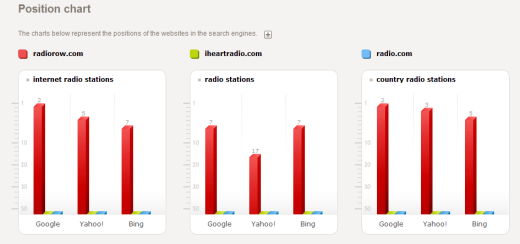 Analytics, Metrics and Music for the Radio Industry
Analytics, Metrics and Music for the Radio Industry
 An Indie Artist Pipeline to Internet Radio
An Indie Artist Pipeline to Internet Radio
 Radio Industry ROI Strategy
Radio Industry ROI Strategy
 A New Breed of Indie Artists
A New Breed of Indie Artists
Join Me on the Word Cloud and Learn
Nothing good comes easy. Staying afloat on search engines, when you're thrown into an ocean of web sites, proves that point today more than ever.
There's been an increased interest by some in the radio industry on where a radio station should rank on search engines. The thread is the same: being listed on the first page is critical, making the second page is OK, and getting listed on page 3 or beyond (ranked number 21 or higher) means little.
I've been doing, and writing about, search engine optimization since 1999. That's when I chose that it wasn't being online that mattered; it was being found online that became my primary objective. This curiosity took me to picking up the phone in that year and calling Google. Thinking it was this big company, I was hoping to find someone willing to talk about how a search engine works. You might say I found the person.
| "[A Word Cloud] ...can help you understand exactly how a search engine views your page and where you need to shift focus to improve ranking." |
Sergey Brin picked up the phone. I didn't know who he was at the time, but we had about a 40-minute conversation on what Google was doing. His voice was filled with the same enthusiasm that mine held. This was new ground for both of us, and he was as interested in talking with a web site owner (who used Google) as I was in talking with someone - anyone - at Google. |
Sergey led me to an article: "The Anatomy of a Large-Scale Hypertextual Web Search Engine." He wrote it with another fellow whose name I never heard before, Larry Page. A deep read, it was also an eye-opening experience which offered a glimpse at what they called a "PageRank Calculation," which went like this...
|
We assume page A has pages T1...Tn which point to it (i.e., are citations). The parameter d is a damping factor which can be set between 0 and 1. We usually set d to 0.85. There are more details about d in the next section. Also C(A) is defined as the number of links going out of page A. The PageRank of a page A is given as follows: PR(A) = (1-d) + d (PR(T1)/C(T1) + ... + PR(Tn)/C(Tn)) Note that the PageRanks form a probability distribution over web pages, so the sum of all web pages' PageRanks will be one. |
This search engine stuff was fun! What I've learned since then has helped keep Audio Graphics' properties at the top of a chosen set of keywords for over a decade. You can check our RadioRow results before proceeding because search engine opitimizing is this article's next point of discussion, and it's important for you to see that we do get results.
I have kept abreast of the importance of search engines for the radio industry for a long time. In June 2003, when asked "What helps you find new Internet radio stations the most?" 34.6% of 1,048 respondents to our Audio Graphics survey of online radio listeners reported "Search Engines." Radio station portals were close behind with 32.8%. Friend's referral lagged at 14.7%.
In May 2005, as social networking was getting a foothold, the same question was asked of 2,467 online radio listeners. It brought the following results: search engines 24.9%, radio portals 21.8%, friend's referral 24.1%.
Asked again in February 2010, 1,010 respondents said search engines delivered 31.3%, radio portals 22.2%, and friend's referral generated 12.7%.
If you were following these reports, it was clear that the radio industry needed to start generating a presence on the top pages of search returns. But not much has changed, as you can see by looking at this comparison of three "radio portals" - Audio Graphics' Radio Row, Clear Channel's iheartradio.com, and the CBS web site Radio.com.
(Click to Enlarge)

This year we revisited the search engine topic in

 February "How to Find Radio Station Web Sites"
February "How to Find Radio Station Web Sites"
 March "No Radio in Search for Radio Industry"
March "No Radio in Search for Radio Industry"
 April "Radio: To Be Found Or Not To Be Found"
April "Radio: To Be Found Or Not To Be Found"Now we see other radio industry people writing about this topic so I know it's finally getting the attention it deserves. But there is a caveat: Be careful on spending time working some of the suggestions I've seen. They won't do much good. I'll give one example, and then a solution to help solve this one problem. Just believe that there are dozens of other false suggestions floating around, all of which will have you waste time getting no improvement on a search engine's rank.
I respect Daniel Anstandig. He's one of the few persons in the radio industry who has created worthwhile online initiatives. But, his recent article on search engine optimization carries one suggestion I would advice against: "Get all of the meta tags on each of your pages set up with keywords that are both highly searched and highly accurate about the content available on the site."
There's only one meta tag worth spending time on, the "meta-description." Meta-keyword tags are not used as an influence by the leading search engine, Google, and they hold little relevance on other major engines. Matt Cutts, head of Google’s Webspam team, has pointed this out a number of times on his blog ("Google doesn’t use the keywords meta tag in web search") - and the Google Webmaster Centeral Blog also states this as fact ("Google does not use the keywords meta tag in web ranking").
What is important, among dozens of web site design considerations, is how a search engine perceives what's written on your page. This is where the Word Cloud comes in. It can help you understand exactly how a search engine views your page and where you need to shift focus to improve ranking.
A Word Cloud expands the presence of keywords, as viewed by a search engine. You may have seen Word Clouds on web sites as they attempt to influence search engines for higher rank. Two sites of people I respect that use this practice are Fred Jacob's Media blog and Jennifer Lane's Audio4cast. The addition of these Word Clouds (or "category clouds") do little-to-nothing for improving how a search engine views your web site, though. They essentially just take up valuable real estate on your page.
Three examples, and we'll call this discussion a wrap.
Here are Word Clouds for RadioRow, iheartradio.com, and Radio.com. View them, and you'll see the exact reason why the chart above shows RadioRow far ahead of the largest companies in the radio industry.
These graphics display how a search engine sees these web sites, not how these web sites want the search engine to see them. In the world of search engine optimization, there is a big difference between the two.
 |
RadioRow |
 |
Clear Channel's iheartradio.com |
 |
CBS Owned Radio.com |







